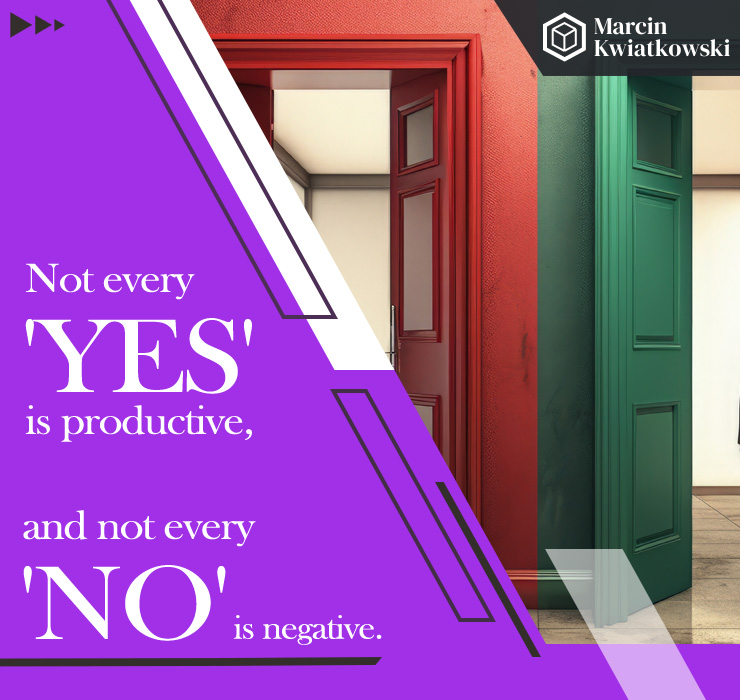
Each of us in the IT industry has experienced this moment—you’re sitting in yet another meeting, you hear a request for a "small favor," and before you know it, your calendar and task list are bursting at the seams with additional commitments. After many years in this field, I’ve learned (often the hard way) that the ability to assertively say "no" is just as important as staying up to date with the latest technologies. In this article, I’ll share my experiences. Hopefully, you’ll find some valuable takeaways too.
The “Just One More Small Task” Trap
I sat in my home office, staring at the screen and feeling another “small favor” transform into a massive commitment. My calendar already looked like a game of Tetris - every free space tightly packed with meetings and tasks I’d accepted because “it’s just a few hours of work.”
The problem was that these “few hours” added up to additional days of work, and I felt increasingly overwhelmed. The worst part? Every time I said “yes,” a part of me was screaming “no!” Does this feeling sound familiar?

Why Is It So Hard for Us to Say No?
In IT, we’re used to solving problems. It’s our specialty! When someone asks for help, our inner hero immediately kicks into high gear. Add to this:
- An industry culture based on collaboration and knowledge sharing
- The pressure to be a “team player”
- Fear of losing your reputation as a helpful colleague
- FOMO related to interesting projects
And we have a recipe for overload.
When I realized
My breakthrough moment came when I realized that my inability to say no wasn’t just hurting me, but paradoxically - it was hurting the team too. Exhausted and scattered, I couldn’t give 100% to tasks where I was really needed.

Assertiveness Isn’t Rudeness
After many ups and downs, adventures, and failures, I learned that assertiveness in IT isn’t about being “the difficult one.” It’s actually a sign of respect - both for yourself and the team. However, declining requests unskillfully can cause others to view you as unfriendly. So we could expand the headline and say that while assertiveness isn’t rudeness, there’s a fine line between them - every person is different and communicates differently.
I’ve been learning assertiveness for a few years now, and I’m getting better at it. Despite this, I’m not an expert or a master of assertiveness. Learning is challenging and takes time. For everyone, it looks different—some learn faster, others slower. I can’t teach you assertiveness, but keep reading. Below, I share my experiences and the lessons life and work have taught me.
1. Recognizing Your Own Boundaries
Accepting everything that landed in my email or Slack and constant context switching often led to frustration. You probably know the feeling - end of day, and you can’t remember what you actually did, despite being busy non-stop.
The first thing that helped me break this vicious cycle was keeping a journal. I wrote down situations where I felt I should have said no but didn’t. After a few weeks, I started seeing patterns - for example, that I always said “yes” to certain people or that I found it hardest to say no in specific situations.
The next step was implementing a “no meetings Friday” rule. Fridays became my meeting-free day where I could focus on my priorities. Initially, I felt strange declining meetings on Fridays, but over time the team accepted and respected it. Interestingly, some even started copying this practice! Note: I noticed that when I was exhausted, I sometimes accepted Friday meetings. Could energy levels affect assertiveness?
I also learned to plan my week in advance, determining what’s really important and what can wait. This way, when someone came with an “urgent” task, I could consciously assess whether I had space for it or should decline. It’s like budget planning - if you know how much money you have, it’s easier to decide what you can spend it on.
These changes didn’t come immediately, and I still sometimes catch myself agreeing to things against my better judgment. There are days when I don’t write anything in my journal. I do what I can, and awareness of my own boundaries and systematically monitoring them has helped me regain control over my time and energy.
2. Managing Guilt
I remember the first time I declined an additional task. I felt terrible - a mix of guilt, fear of others’ reactions, and doubts about whether I was doing the right thing. If you’re reading this and nodding in understanding, know that you’re not alone.

I learned several important things about managing this guilt:
First - by saying no, you’re actually helping. Sounds ridiculous? Maybe. But by giving others space to solve problems on their own, you enable their growth. I remember many situations where someone on my team solved a difficult problem independently, precisely because I couldn’t help them then. Later when I asked how it was going, it turned out to be resolved.
The truth is that initially, people might be unhappy with your refusal. That’s normal - they were used to you always saying “yes.” I remember how one supervisor was practically offended with me for a while when I refused to take on additional responsibilities. But you know what? I survived it, and over time he began to respect my time more and plan ahead when he needed my support.
Importantly - assertiveness doesn’t mean refusing everything to everyone. In my team, there are people whom I almost never refuse to help because our collaboration is valuable to me and gives me energy. There are also projects I engage in willingly because they align with my career goals. The key is conscious choice, not automatic “yes” or “no.”
If you feel paralyzing fear about the consequences of refusing - for example, you’re afraid you’ll lose your job or everyone will turn away from you - this might be a signal that it’s worth talking to a specialist. I myself sought help from a psychotherapist who helped me understand the sources of this fear and taught me techniques for dealing with it.
Also remember that an exhausted programmer is a threat to the project. Code written on your last legs, decisions made in a state of exhaustion - that’s a straight path to errors and problems. Paradoxically, by refusing additional commitments when you’re already at the limit of your capabilities, you’re protecting not just yourself, but also the project and team.
Over time, you’ll notice that people start respecting your boundaries more. In my case, after several months of consistent assertiveness, colleagues began asking “do you have space now for…” instead of assuming I was always available. It’s a small victory, but it shows that it’s worth being patient in building healthy boundaries and relationships.
3. The Specifics of Remote Work
When I switched to remote work, after some time I understood that assertiveness in the online world requires a slightly different approach. You can’t just close an office door or show with a gesture that “I’m busy.” In a remote environment, every Slack message or unexpected call invitation can pull you out of flow.
From my own experience, I know that writing everything down is key. Ideally, after an important meeting, make a brief summary and send it to participants. Sounds like extra work? Maybe, but it can save your skin when someone “remembers” that I promised to take care of an additional task. Having written confirmation of arrangements makes it easier to refuse things you never promised.
Calendar is my second favorite tool for maintaining assertiveness. I had a period where I blocked fixed hours for deep work - for example, mornings from 8 to 10. They appeared in the calendar as “Deep Work - No Meetings.”
I also established clear “working hours” - I’m available from 7 to 15. After 15, my Slack is muted and email notifications are off. At first, I wondered - what if there’s something important? But over time I understood that real crises are rare, and if something is truly important, I’ll find out about it.
Practical Templates for Declining in Different Situations
Below you’ll find templates you can use as inspiration.
Delayed Response
"Thank you for the proposal. I need to check my calendar.I'll get back to you by 3 PM at the latest."Conditional Agreement
"I can help with this task, but not until next week.Would that work for you?"For Additional Projects
"Hey, thanks for the offer, but I’m currently fully committed to Project X and want to stay focused on it. I’d prefer not to take on anything additional, as I wouldn’t be able to do it properly. If needed, I can recommend [name] or revisit this topic once I’ve wrapped up my current project (likely around [date])."For Urgent Help Requests
"Listen, I know this is important, but I’m in the middle of a task right now, and if I stop, everything will fall apart. Can we talk about it at [time/date]? In the meantime, check out [link/docs/whatever]—maybe you’ll find what you need there."For Additional Meetings
"Hey, thanks for the invite. I’m swamped with work and can’t make it to the meeting. Can we push it to next week? Or, if you prefer, I can review the materials on my own and get back to you via email with my thoughts."What’s Next?
Assertiveness is a journey, not a destination. Each of us is at a different stage. Perhaps it’s worth pausing for a moment to reflect:
- What do our current commitments look like? Which ones are truly important to us, and which did we accept because “it’s expected”?
- How do we communicate our needs and boundaries? What might change if we tried new ways of expressing ourselves?
- Do we remember situations where we regretted our inability to say no? What might these memories tell us about our behavioral patterns?
- How often do we notice and appreciate moments when we successfully maintained our boundaries? Can we find joy in these achievements?
Bonus: Red Flags - When You Should Definitely Say No
- When the task requires working after hours/weekends
- When you lack competency in the area
- When the project has no clearly defined time boundaries
- When your current critical tasks would suffer
- When you feel physical discomfort at the mere thought of another commitment
Remember - assertiveness isn’t about being unkind. It’s about maintaining the quality of your work and long-term good relationships in the team.
If this article was helpful to you, subscribe to my newsletter. Every week I share practical tips on how to grow in IT while maintaining work-life balance and taking care of your mental health.
